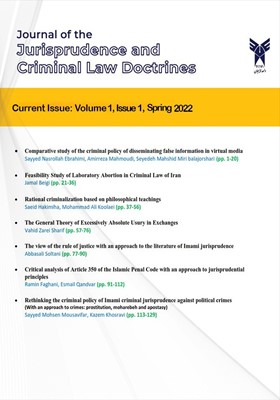Comparative study of the criminal policy of disseminating false information in virtual media
Subject Areas : Jurisprudence and Criminal Law Doctrines
seyyed nasrollah ebrahimi
1
*
,
amirreza mahmoudi
2
,
Seyedeh mahshid Miri balajorshari
3
![]()
1 - Department of Law, Faculty of Law and Political Science, University of Tehran.
2 - Islamic Azad University, Lahijan Branch, Ghilan, Iran.
3 - Islamic Azad University, Lahijan Branch, Gilan, Iran.
Keywords: Criminalization of disseminating false information, criminal policy of disseminating false information, criminal regulation of social media,
Abstract :
With the increase in the use of virtual space, the popularity of social networks has also increased. Although virtual networks provide the opportunity to easily share news and information, they cause many problems, including the uncontrollable dissemination and sharing of unfounded and false information. , by countless users of those networks and sometimes, it is a disturbance in public order. One of the most concrete examples in this field is the dissemination of baseless and fake information during the global epidemic of Covid-19. In this difficult period, in social networks, baseless and false news were published about the lack of sufficient measures by competent and responsible institutions in the prevention and treatment of corona disease; Various fake pages and messages were created and uploaded; Fake images and unreal sounds were shared, and in this way, social networks became a common and effective tool to create public concern and panic. Paying little attention to the mentioned fact alone shows the necessity of establishing criminal laws in order to protect the health of social networks and prevent the contamination of information in virtual media; Therefore, this article, with the aim of explaining the common criminal policy in criminal law systems, regarding the dissemination of false information in social networks and virtual media, reports this result through a comparative study of the criminal laws of a number of countries. It shows that in recent years, many countries follow a single criminal policy by imposing criminal regulations against the publication of false information in social networks and virtual media.
_||_

